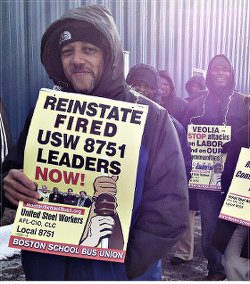

The attempt by Veolia, an international conglomerate, to bust the Boston School Bus Drivers Union has created a widespread fightback movement. Its next focus is Solidarity Day 2 (SD2), a demonstration set for Feb. 1 outside the company’s headquarters.
The struggle to rehire the four illegally fired leaders of United Steelworkers Local 8751 has become a household name in Boston’s movement. The Massachusetts AFL-CIO has backed the struggle, other unions have signed on, and many community-based organizations — from the Coalition for Equal Quality Education to local African-American radio station Touch 106.1 — are mobilizing for it.
Boston-area union activists with SEIU 1199, the Boston Teachers Union and American Postal Workers Local 100 are supporting the rally, as well as community and activist groups like Nation of Islam, Industrial Workers of the World and Roxbury-based Safety Net. Vans and buses are coming from Baltimore, New York and Rhode Island.
Boston is fast becoming ground zero for the growing movement against Veolia.
At the center of Boston’s movement and keeping it alive is the local’s dynamic rank and file. Going into the fourth month of the struggle — a time when momentum might be expected to fade — this predominantly immigrant workforce of Haitian and Cape Verdean drivers continues to mobilize in large numbers.
On Jan. 23, more than 100 drivers staged a demonstration/occupation of Veolia’s offices during a step 2 grievance hearing about the four fired drivers. Members set up a picket line, then spilled into the central office room, the hallways and adjoining office spaces, refusing the company’s orders to leave.
Exuberant mobilizing meetings for SD2 have taken place at the city’s four bus yards. The harsh weather has led these impromptu gatherings of dozens of drivers, which are usually called yard meetings, to take place in Veolia buildings, right under the noses of the union-busting bosses. The fired drivers — Garry Murchison, Andre Francois, Steve Kirschbaum and Steve Gillis — have been motivating the crowds with speeches and stacks of leaflets for SD2.
This defiant determination on the part of the school bus drivers has been there from the beginning of this struggle. On Nov. 9, 600 drivers (out of 870) marched through Boston for Solidarity Day 1, and on Nov. 21, 300 packed Boston City Council chambers.
The drivers know that the fight to rehire the union leaders is about resisting a broader, austerity-based attack on their wages and benefits. Since taking over Boston’s school bus contract in July, Veolia has switched providers in order to lower insurance benefits, shorted wages due to an unauthorized GPS-based pay system and violated the members’ seniority.
Attacks on desegregated education
A known union-buster, Veolia was hired in Boston as part of an orchestrated assault on desegregated education. The successful struggle to win busing and equal-access education in the 1970s has confronted an unrelenting campaign ever since from entrenched racist elements in the city establishment.
In 2009, the Boston School Bus Drivers Union joined educators and community forces in a successful campaign to beat back the “five-zone plan,” an attempt by the heads of the Boston Public Schools to reduce the number of schools open to students under a decades-old three-zone plan.
But the forces of reaction haven’t given up. This month marks the Boston schools’ implementation of an updated incarnation of that plan, with the “zone plan” being replaced by an “algorithm.”
Promoted as a neutral, computer-based calculation, the algorithm drastically limits the choice of schools for African-American and Latino/a families. It also dismantles the right to busing won in the 1970s through the people’s struggle.
A successful lawsuit by Black parents to desegregate Boston’s schools had established the practice of busing, which the movement then protected as a right. Anti-racist demonstrations and the School Bus Drivers Union eventually beat back the fascist, city-backed mobs who had violently attacked Black students.
A Jan. 27 article in the Boston Globe admits that the algorithm replaces the “plan to comply with court-ordered desegregation.” It shows that parents and students now face drastically reduced choices in what schools they are allowed to pick.
The new system also separates siblings from each other — unless parents know to request the older siblings’ school, which the article admits they often do not. And it narrows choices even further for students who have special needs requirements.
The article begins with the example of a parent who thought that the elimination of zones meant that she had more choices, not less. Apparently, the Boston Public Schools’ promotional campaign on the new system has been more propaganda- based than informational. No wonder. The campaign’s billboards across Boston were paid for by none other than Veolia Transportation.
Veolia has become the target of multiple communities and movements in the U.S. On Feb. 8, Local 8751 Vice President and fired driver Steve Gillis will travel to San Francisco for a national conference. “The Fight Against VEOLIA: Stop Privatization, Defend Human Rights & the Environment” will unite many forces fighting the criminal corporation. With its union-busting activities, privatization plans and support for Israeli apartheid, Veolia is inadvertently helping to unite different forces in the political spectrum into a new people’s movement in the age of austerity.
As part of Workers World newspaper’s coverage marking the 50th anniversary of the liberation of…
From the PFLP Central Media Office The following statement from the Popular Front for the…
Newark, New Jersey Over 250 people, representing over 250 New Jersey endorsing community groups, attended…
Special to Workers World The following is a press release issued on April 24, 2025,…
dear Larry Krasner, we heard you sued Elon Musk over his corrupt million election giveaways…
Unions join forces against harassment and deportation of members When 200 immigrant workers – from…